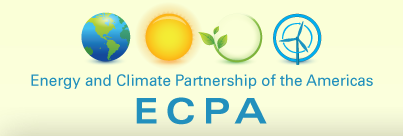The Clearinghouse for the Energy and Climate Partnership of the Americas (ECPA) has released the latest issue of its ECPA Clearinghouse Newsletter, providing briefs on several recent regional events related to energy and climate issues.
 18 November 2013: The Clearinghouse for the Energy and Climate Partnership of the Americas (ECPA) has released the latest issue of its ECPA Clearinghouse Newsletter, providing briefs on several recent regional events related to energy and climate issues.
18 November 2013: The Clearinghouse for the Energy and Climate Partnership of the Americas (ECPA) has released the latest issue of its ECPA Clearinghouse Newsletter, providing briefs on several recent regional events related to energy and climate issues.
The newsletter leads with a piece on the Expert Panel on Sustainable Cities and Communities, which convened in Washington, D.C. on 29 October 2013, to discuss strategies cities need to adopt to promote rationale energy and water use, efficient transportation and reduced carbon emissions. The newsletter also summarizes the 9 October 2013 sustainable energy roundtable convened by ECPA on the fringes of the 2013 Caribbean Renewable Energy Forum (CREF) held in Aruba, and previews the 20-22 November 2013 Andean workshop in Quito, Ecuador on the impact of climate change on snow, glaciers and water resources in the Andes.
The newsletter also discusses the close of the Caribbean Initiative, which provided legal and technical support on sustainable energy and helped deploy six pilot projects, and the launch of the ECPA Renewable Energy and Climate Science for the Americas Initiative, which seeks to foster effective and reliable measurements and standards sustain the region’s deployment of renewable energy technologies.
The rest of the newsletter introduces a new ECPA Strategic Partner, Bolivia’s Center for Information on Renewable Energies, spotlights Mexico’s “public pocket park” strategy to renovate public spaces, and discusses a webinar on entrepreneurial challenges and opportunities in clean energy projects, and a project in Costa Rica and Honduras to generate electricity from biogas generated from agricultural waste.
The ECPA is a flexible and voluntary mechanism through which governments may lead multi-country or bilateral initiatives to promote clean energy, advance energy security, fight energy poverty, and reduce greenhouse gas emissions. Under the ECPA, the lead and/or participating governments and public and private sector partners contribute resources to implement the initiatives. The Organization of American States (OAS) serves as the ECPA Clearinghouse. [ECPA Clearinghouse Newsletter, November 2013]